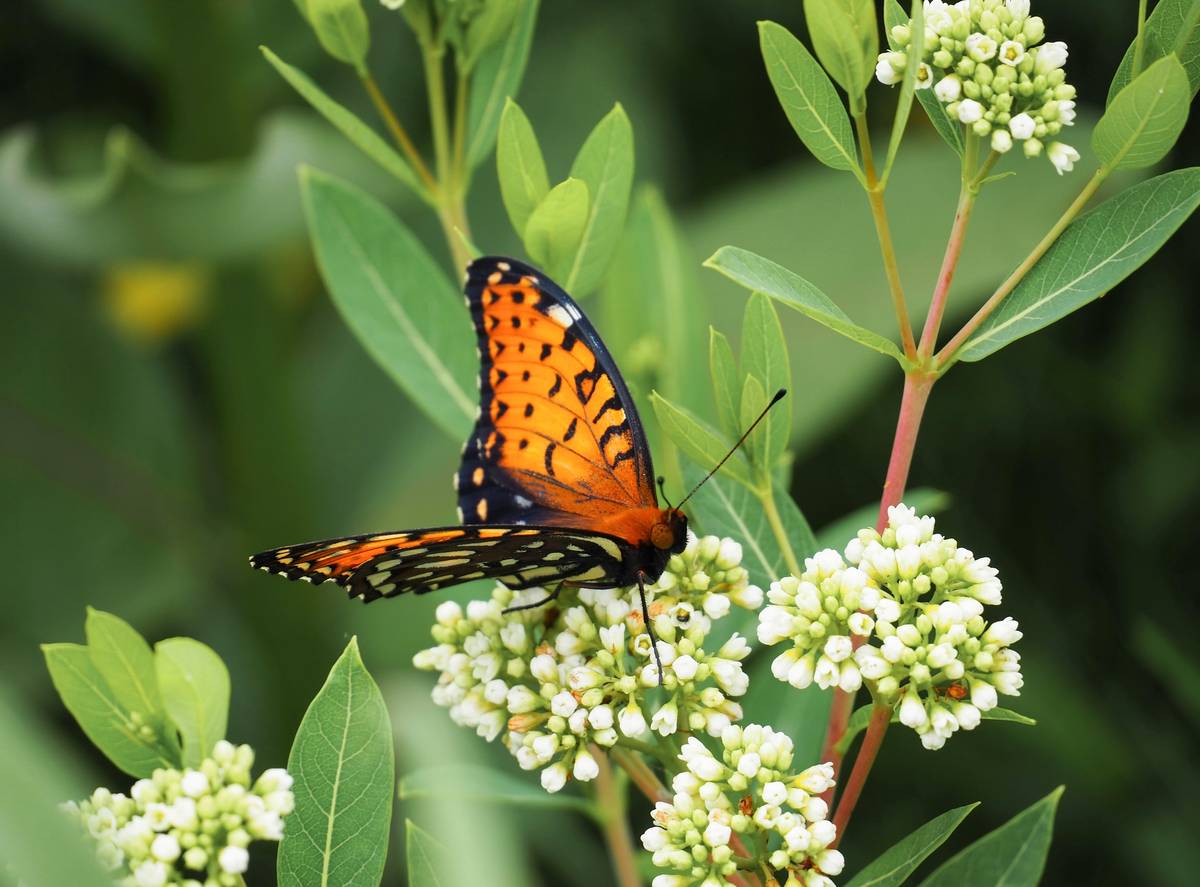An endangered butterfly that can be found in just one location in the eastern United States would gain new protections if a proposal by the U.S. Fish and Wildlife Service is approved.
The federal agency proposes to list both subspecies of the regal fritillary, a large but increasingly rare butterfly, under the Endangered Species Act. The proposal would list the eastern regal fritillary (Argynnis idalia idalia) as endangered and the western regal fritillary (Argynnis idalia occidentalis) as threatened, with an accompanying rule that would tailor protections to balance conservation with land management activities.
Although the western subspecies can be found in 14 states in the native grasslands of the central and northern Great Plains and portions of the Midwest, its eastern cousin is less widespread. Once ranging from New Brunswick to North Carolina, the eastern regal fritillary is now found in just a single location; the Fort Indiantown Gap National Guard installation in Annville.
Both subspecies need violets to support larval growth, nectar sources that sustain breeding females into the fall, and native grasslands with tall vegetation that provide shelter for all life stages.
Unlike its visually similar cousin, the monarch – regals are said to look like a “monarch dipped in chocolate” – the regal fritillary butterfly does not migrate and instead lives out its days on grasslands, each summer a lifetime for every new generation. Increased housing and farming – as well as the popularity of lawns, which are spacious but are also ecological dead zones – in the East have sharply reduced the availability of grassland habitats. Today, Fort Indiantown Gap is alone in the northeastern U.S. for having a consistent population of regals.
The eastern subspecies is in danger of extinction because it is limited to a single location in the eastern U.S. If the habitat at FTIG is lost or degraded, butterflies would be unable to disperse to other sites. Unfortunately, according to the U.S. Fish and Wildlife Service, the ongoing effects of climate change and drought exacerbate threats to its rare habitat. Changes in temperature and moisture could impact bloom times and the overall productivity of native violet species, which the eastern regal fritillary’s caterpillars need to survive.
In collaboration with the agency, FTIG finalized a Candidate Conservation Agreement in February to formalize its commitment to conserve the eastern regal fritillary. In May, Fort Indiantown Gap – in cooperation with the Wildlife Service and Temple University – received more than $1 million from the Department of the Army to help implement the actions identified in the agreement, including managing habitat, developing a long-term monitoring protocol for the existing population, and establishing a new population in collaboration with the Pennsylvania Game Commission.
An area of Fort Indiantown Gap is particularly suited for the regal because of the frequent soil disturbance and patchy fires that come with being a bombardment zone. These explosive disturbances actual help to create the conditions that most appeal to the regal, which require three main habitat components for the butterflies to flourish:
- Larval host plants, like arrow-leaf violet.
- Adult nectar sources, like milkweed and thistle.
- Bunch grasses, like little bluestem and broomsedge.
In the mid-1990s, biologists at FTIG took steps to propagate the plants regals depend on and remove the woody vegetation that can interfere with the growth of the desired vegetation. Biologists also have run a captive rearing program for the regal fritillary in partnership with ZooAmerica.
Each year, the base offers habitat tours for enthusiasts of the lepidoptera, the scientific name for the order of winged insects.
The federal proposal for their protection is available for public inspection through Oct. 7. The recommendation was informed by an independently peer-reviewed Species Status Assessment.
Questions about this story? Suggestions for a future LebTown article? Reach our newsroom using this contact form and we’ll do our best to get back to you.

Keep local news strong.
Cancel anytime.
Monthly Subscription
🌟 Annual Subscription
- Still no paywall!
- Fewer ads
- Exclusive events and emails
- All monthly benefits
- Most popular option
- Make a bigger impact
Already a member? Log in here to hide these messages
Quality local news takes time and resources. While LebTown is free to read, we rely on reader support to sustain our in-depth coverage of Lebanon County. Become a monthly or annual member to help us expand our reporting, or support our work with a one-time contribution. Cancel anytime.
























